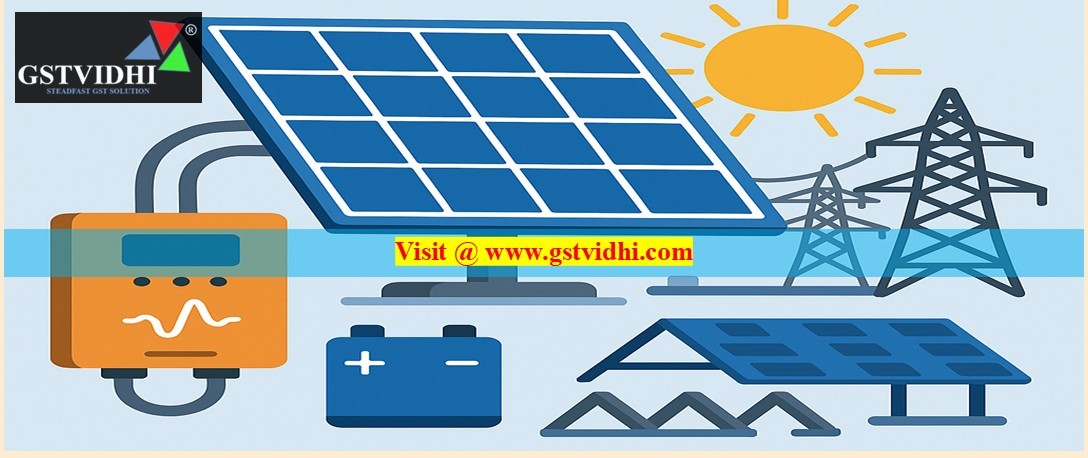
GST Classification of Solar Power Generating System Components –
Haryana AAR Rules on Composite vs. Mixed Supply
Introduction:
The
Haryana Authority for Advance Ruling (AAR) in its ruling HR/ARL/17/2021-22
dated August 24, 2022, addressed a significant question related to classification
and taxability under GST for components of solar energy systems when
supplied together or individually. The applicant, M/s M.N. Solar Co., a
dealer and proposed manufacturer of solar inverters and batteries, sought an
advance ruling regarding the GST rates applicable to different combinations of
solar power equipment.
Applicant
Details
- Applicant:
M/s M.N. Solar Co.
- Location:
Ganaur, Sonipat, Haryana
- GSTIN:
06BEDPN4222D1ZO
- Order No.:
HR/ARL/17/2021-22
- Date of Ruling:
24.08.2022
- Legal Provisions Invoked:
Section 97(2)(a), (b), and (c) of CGST/HGST Act, 2017
Questions
Raised by the Applicant
1. Whether
the solar inverter manufactured by the applicant qualifies under Entry
No. 234 of Schedule I of Notification No. 01/2017–CT (Rate) and is eligible
for 5% GST.
2. Whether
solar batteries manufactured and sold to solar power plant developers
qualify as parts of solar power generating systems under the same entry.
3. Whether
supply of solar inverter, battery, and solar panel together in a single package
would qualify as a solar power generating system attracting 5% GST.
Summary of
Applicant's Submissions
- A solar inverter is a
renewable energy device converting DC to AC and supports solar panel
integration.
- A solar battery stores energy
produced from solar panels and provides backup to ensure steady power
output.
- The applicant procures solar panels
and controllers from the open market and bundles them with inverters and
batteries for sale as a complete solar power generating system.
- The applicant argued that such a
bundled supply qualifies as a composite supply, with the principal
supply being a renewable energy device, thereby attracting concessional
GST.
Legal Basis
Cited by the Applicant
- Entry No. 234 of Notification No.
01/2017–CT (Rate): Lists “solar power-based
devices” and “solar power generating systems” eligible for 5% GST.
- Relevant Tribunal Decisions:
- Commissioner of Customs, Cochin vs.
Solgen Energy Pvt. Ltd.: Solar inverter
held to be part of a solar generating system.
- BHEL v. CCE:
Inverter charger cards considered as part of solar lanterns/systems and
eligible for exemption.
Haryana AAR
Observations and Analysis
The Authority analyzed
each item and combination supplied by the applicant to determine the correct
classification under GST.
(i) Solar Panel +
Inverter + Battery + Controller – Composite Supply
- When these four items are supplied together
in a single bundle, they qualify as a “Solar Power Generating
System”.
- This is considered a composite
supply, where the principal supply is the solar generating
system.
- Applicable GST Rate:
12% (6% CGST + 6% SGST) as per the updated rate applicable under
Entry No. 234 (post amendment via Notification No. 08/2021–CT (Rate)).
(ii) Solar Inverter +
Battery – Not a Complete Solar System
- This combination does not qualify
as a solar generating system.
- Since the supply does not include
solar panels (the energy source), it cannot be considered a complete
system.
- Such a combination is treated as a mixed
supply, and the highest GST rate applies, i.e., 18%.
(iii) Individual Supplies
– No Composite Supply
- If the components (solar inverter,
battery, panel, etc.) are supplied individually and invoiced
separately, they are not composite supplies.
- Each item will attract its individual
applicable GST rate:
- Solar Panel
– 5% (Renewable energy device)
- Battery
– 18%
- Controller
– 18%
- Inverter
– 18%
Key Legal
Concepts Explained
- Composite Supply [Sec 2(30), CGST
Act]: Two or more supplies that are naturally
bundled, supplied together, and where one supply is principal.
- Mixed Supply [Sec 2(74), CGST Act]:
Two or more individual supplies made for a single price, not
naturally bundled.
- Tax Treatment [Sec 8, CGST Act]:
- Composite Supply → Tax rate of principal
supply.
- Mixed Supply → Tax rate of highest-taxed
item.
Final
Ruling of Haryana AAR
|
Scenario
|
Classification
|
Applicable
GST
|
|
Solar
Panel + Inverter + Battery + Controller (Supplied Together)
|
Composite
Supply – qualifies as Solar Power Generating System
|
12%
GST (Entry 234 of Notification 01/2017 as amended)
|
|
Inverter
+ Battery (No Panel)
|
Mixed
Supply
|
18%
GST
|
|
Individual
Items Supplied Separately
|
Individual
Supply
|
Panel
– 5%, Others – 18%
|
Note:
The AAR held that the manufacturer or trader status of the supplier does
not alter the taxability. The classification is based solely on the nature
and bundling of supply.
Conclusion
This ruling offers
critical clarity for businesses dealing in solar products:
- Bundling of solar components must be carefully
structured to qualify as composite supply of a solar power
generating system.
- Supplying incomplete sets or
partial components may expose the business to higher GST under
mixed supply rules.
- To claim concessional GST under Entry
234, the supply must include solar panels, and the entire
package must be billed as one composite unit.
Disclaimer: All the Information is based on the notification, circular advisory and order issued by the Govt. authority and judgement delivered by the court or the authority information is strictly for educational purposes and on the basis of our best understanding of laws & not binding on anyone.
Find the Attachment (Press on Click Here )
Click here